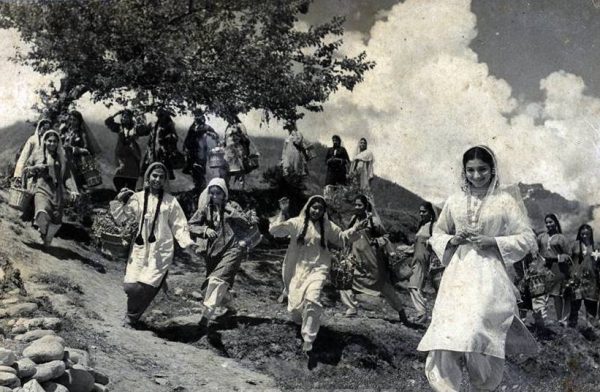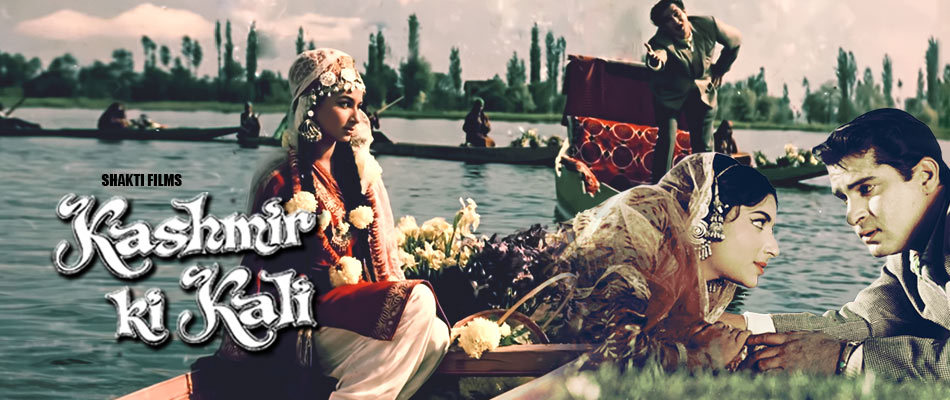Kashmir Ki Kali (1964) is one of Shammi Kapoor‘s most memorable films. Helmed by Shakti Samanta, the film is also remembered today for introducing Sharmila Tagore to a pan-Indian audience. The film, taking off from the Rock Hudson-Gina Lollobrigida starrer, Come September (1961), fitted the 1960s Hindi commercial film fluffy template set by Kapoor’s earlier Junglee (1961) perfectly – a colour film set in a picturesque hill station, here Kashmir, a rich boy who chases and woos poor girl, a villain (yes, it’s Pran) who also covets the girl, and a lost-and-found twist thrown into the masala mix. All this held together with a superbly hummable musical score. Kashmir Ki Kali boasts of some of the finest songs ever composed by OP Nayyar, be it the peppy Taareef Karoon Kya Uski, the heady Deewana Hua Badal, the vibrant Isharon Isharon Mein, or the heart aching Hai Duniya Usiki Ki among others.
Ironically, Nayyar was never the first choice for Kashmir Ki Kali at all. According to filmmaker Shakti Samanta’s son, Ashim, Shankar-Jaikishan were the original choice for the film as they had already formed a hugely successful partnership with Shammi Kapoor. But Nayyar, who had already worked with Samanta in Howrah Bridge (1958) and Jaali Note (1960), invited the latter to listen to some tunes he had composed. Samanta was totally taken in by all 30 odd tunes that Nayyar played, choosing 12, which he used between Kashmir Ki Kali and their next film together, Sawan Ki Ghata (1966).

One beautiful composition that Samanta selected was recorded by Nayyar as a solo sung by Asha Bhosle, Balma Khuli Hawa Mein. The song was filmed on Sharmila Tagore and other girls amidst the hills and according to some old timers the film released originally with the song very much present in the film. In fact, according to viewer Ramesh Bhagwan commenting on Greta Kaemmer’s piece on the film, “This song was shown in the theatres in the first week of its release in 1964 and I was lucky to have seen it. It was a lilting melody superbly picturised with Sharmila serenading in the lush Kashmir with her duppatta flying over her head.” Sadly for the film, a week into its release, someone from the Censor Board suddenly woke up and decided that when the ‘khuli hawa’ caused Tagore’s duppatta to fly in the breeze, her breasts, though safe under her ‘kameez’, heaved a little too much for comfort. What’s more, when the duppatta fell back on Tagore, it fell on her head and not on those offensive shaking breasts. The song, in danger of morally corrupting the Indian film going public, had to go. Faced with having to delete the song or risk the Censor Board revoking the film’s certificate altogether, Samanta chose the former so that the film could continue its uninterrupted run in the theatres.
According to both, Ramesh Bhagwan and the blog, Conversations Over Chai, the song followed the scene the night before when a repentent Sharmila Tagore puts a blanket over a shivering Shammi Kapoor after she and her companions threw water on him and the fire he lit to stay warm in the night. Driving around the next morning, he hears her singing the song and traces her out, followed by the scene where he returns the blanket to her. As seen in the film now, only a little alaap of Bhosle singing remains as Kapoor drives around the hills before the scene with him and Tagore kicks in.
Fortunately for listeners, HMV included the song in its discs of the film and in various compilations of Asha Bhosle songs. So we can, at least, hear this wonderful song even if we can’t ‘see’ it. Still, the loss is undoubtedly ours.



nice info. thanks. they should include the song in the dvd at least.
Yes, provided the footage exists and has been preserved. In the case of Guru Dutt, at least, and there were lots of deleted songs, incomplete films in his filmography, his son, Arun Dutt, told me that in those days, when they discarded something, they threw it all away. So we will never get to see Jata Karan Hai Deewane (CID, 1956) or Rut Phire Par Din Hamare (Pyaasa, 1957) or Sahil Ki Taraf Kashti Le Chal (Sahib, Bibi Our Ghulam, 1962)…
Very interesting story behind a rare gem. At least we are lucky to have the song preserved for us. Thanks for the story
Thank you.
Yeah, I too felt the same. The the lyrics, singing and music are all fantastic. The picturization also must be…… now the censoring is not so harsh. At least now the video should be released!